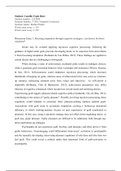Student: Camilla Tepin Rizzi
Student number: 2253488
Seminar number: 5 (The Tempted Consumer)
Seminar leader: Ruthie Pliskin
Word count essay 1: 263
Word count essay 2: 265
Discussion Essay 1: Resisting temptation through cognitive strategies: can desires be down-
regulated?
Desire may be avoided applying top-down cognitive processing: following the
guidance of higher-order goals prevents developing desire in its conscious form and refrains
it from becoming temptation (Hofmann & Van Dillen, 2012). These findings are applied to
certain desires that are challenging to downgrade.
When eliciting a sense of achievement, incidental pride results in indulgent choices,
while it generates goal-consistent behavior when it prompts self-awareness (Wilcox, Kramer,
& Sen, 2011). Self-awareness could emphasize top-down processing, which increases
likelihoods of keeping set goals, whereas sense of achievement (SA) may occur as a bottom-
up stimulus, redirecting attention away from values and objectives. As self-control is
depletable (Hofmann, Vohs & Baumeister, 2012), achievement perceptions may inflict
illusions of cognitive exhaustion which incentivizes reward needs and satisfying desires.
Experiencing guilt triggers pleasure-related cognitive paths (Goldsmith, Cho, & Dhar, 2012),
contributing to the notion of “guilty pleasure”. Possibly involving top-down processing, these
cognitions would translate in conscious form: pleasure-seeking replaces optimal goals.
Associations with guilt seem to accentuate temptation exerting a bottom-up attentional
influence, in which working-memory focuses on past experiences of guilt (eradicated in
pleasure). In this case, using a top-down strategy does not affect down-regulating desire, as
guilt may guide pleasure. Guilty pleasures are difficult to be addressed, both through top-
down and bottom-up strategies.
Psychopaths do not experience guilt, but they seek pleasure, and often derive it from
guilty behaviours. Neuroimaging could differentiate brain-areas’ activation in psychopaths
and the typically developing, uncovering pleasure cognitions of who does and who does not
feel guilt. This could reveal a cultural rather than emotional form of guilt-activation in
psychopathy.




